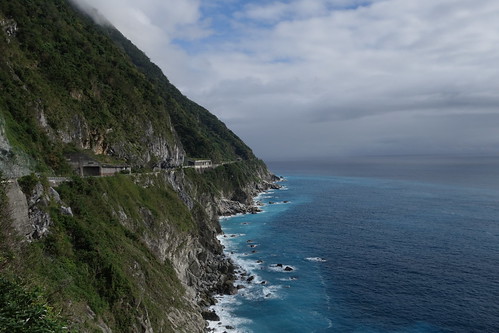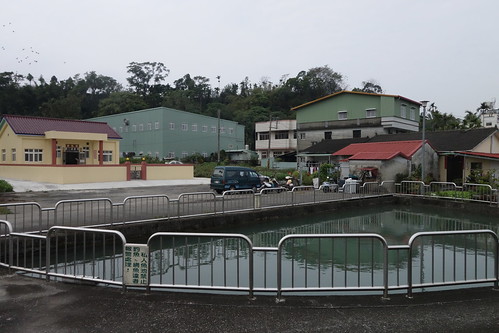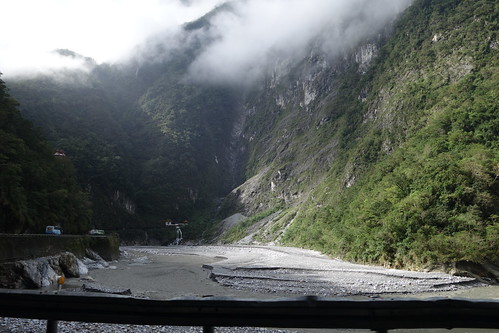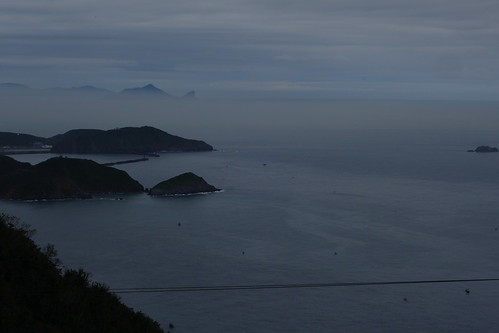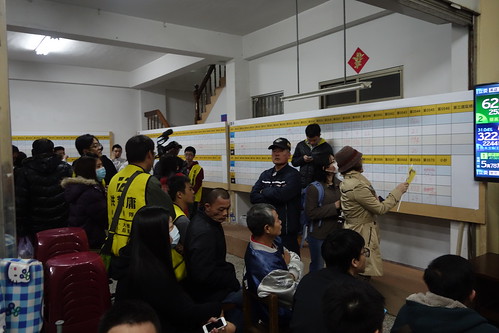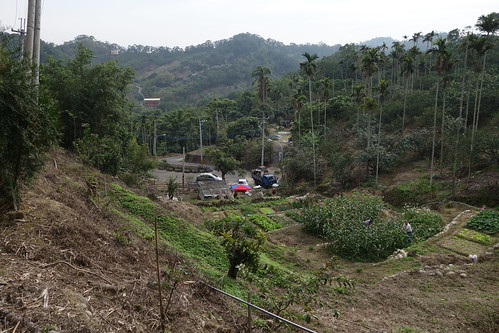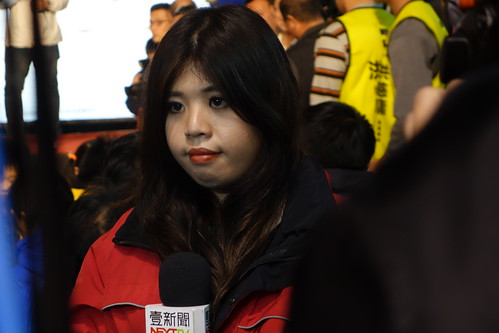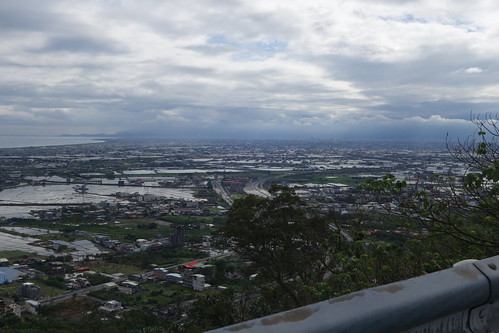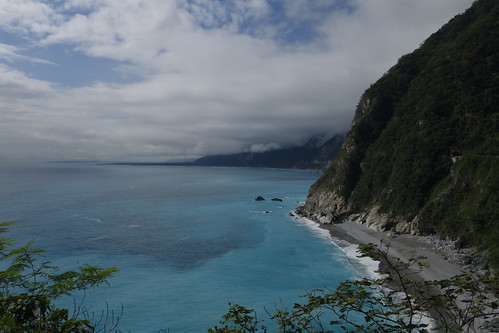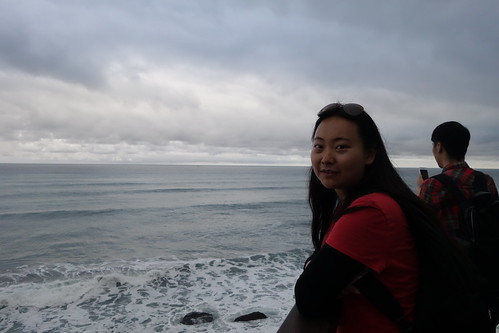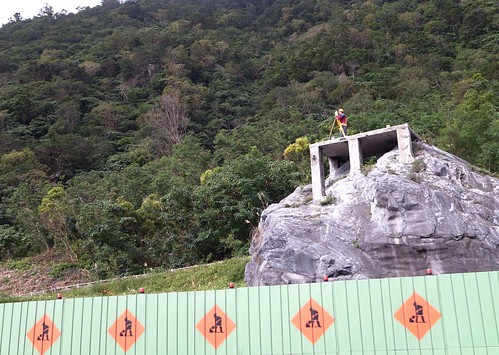A lovely Suhua Highway shot. Just because.
MEDIA SEA CHANGE: DPP and Third Force success is scrambling the old media narrative, forcing the international media to confront the necessity of explaining why Taiwanese support the DPP and their desire to be independent, since DPP success is so obvious the media can't ignore it. Just think: if the KMT were doing well, none of this would be out there for the international public to read. But TIME
was right out there yesterday with a great quote from Scott Harold at RAND:
According to Scott Harold, a China expert at think tank RAND Corp., a DPP victory could mean “a very substantial change in the tenor, tone and prospects for cross-strait relations.” Washington’s priority, he adds, will be to “convince the Taiwanese not to take steps that are deliberately provocative, or unnecessarily highlight their differences with China.” Of course, “none of this is directly caused by the DPP,” Harold says. “It’s China’s reaction and not the fault of the people of Taiwan for democratically electing whom they choose to govern them.”
When was the last time anyone cited in the international media so forthrightly stated the obvious? I'm lovin' it. I met Scott Harold years ago, and I'd like to say I remember him, but the truth is that my wife has to reintroduce me to my kids whenever I am away for a few days, because I've forgotten their names. Thanks Scott...
The other marker of the tremendous sea change taking place in the international commentariat is the latest piece at Foreign Affairs. For years Foreign Affairs has run uninformed anti-Taiwan, anti-democracy, pro-China pieces about Taiwan (l
ike Chas Glaser's nonsense), really sad stuff. Suddenly they ran
this wunderbar piece, which ends...
The real revolution of a DPP victory in Taiwan will be a revolution in identity. There is already a pitched battle in Taiwan over the teaching of history. In the old textbooks, the history of the Chinese people began in the fertile valley of the Yellow River and ended in exile on the rocky island of Taiwan. In the new textbooks, the lush island of Taiwan was buffeted by historical forces beyond its control but ultimately found its way to democracy, prosperity, and independence.
The emergence of a distinctively Taiwanese identity is bitterly resisted by the old guard of the KMT, but the people of Taiwan overwhelmingly identify either as Taiwanese or as a mix of Taiwanese and Chinese. Nearly 90 percent of Taiwanese want equal status for their country in the international community. While these numbers are somewhat suspect—the questions seem designed in such a way as to elicit a positive response—the overall trend is clear. Although most can trace a Chinese heritage, very few people in Taiwan want to be Chinese.
American pundits often discuss whether the United States should accommodate China through the Finlandization of Taiwan or even abandon Taiwan to China. Such analyses are at least 30 years too late. Taiwan will never again be part of China. That train has left the station. Taiwan is a highly successful country of more than 23 million people with its own politics and its own place in the world. Admittedly, that place may fall short of what many Taiwanese people want for their country, but it is nonetheless secure. January’s election won’t change that.
This last week has been like waking up in an alternate universe.... EJINSIGHT observes that
Beijing is to blame for Taiwan's political choices by providing no benefits for ordinary Taiwanese, while showing in Hong Kong that One Country, Two Systems is a hollow promise. Blaming Beijing? *swoon*
Over at ChinaFile Anna Beth Keim has been turning out some superb stuff recently.
This latest piece is on the young Blues and how they've become Green. A detailed look, don't miss it. And over at Quartz.com
a great piece details with numbers how the election is about way more than China.
KMT INTRIGUES: Next Media reported wednesday that President Ma Ying-jeou was interested in becoming Chairman of the KMT when Eric Chu steps down to take responsibility for this election loss.
A Ma spokesman came out wed night saying there was no possibility of that occurring [translation: it's not a possibility but a certainty] and Ma was not interested [translation: he really wants it]. Former KMT presidential candidate and reactionary dominatrix Hung Hsiu-chu has already expressed interest in taking over as Chairman after the loss. Interestingly, Jason Hu, the former mayor of Taichung, the smart politician who took over as campaign manager for Eric Chu, said he had no plans for run for the job [translation: he's planning to]. It means that I am not the only one thinking Hu was plotting a return to some position inside the KMT (he'd make an excellent chairman but is often seen as a Ma rival).
I expect Ma at some point to announce that he has been reluctantly persuaded to run for Chairman. No doubt the Danshui grandmother who persuaded Eric Chu to run for President has a sister somewhere...
Note that unlike some other KMT campaigns, the Chu campaign has not suffered a full-blown meltdown... instead it's sending around resentment-filled videos of middle class people in their 50s.
The latest...
The meltdown I have in mind is of course the Taipei legislative race between heavy metal rocker and smart politician Freddy Lim and longtime Deep Blue politico Lin Yu-fang. As Solidarity pointed out, this race was actually getting less local coverage than international, until KMT candidate Lin Yu-fang melted down.
Frozen Garlic has the call, short and funny, while Solidarity has
the longer analysis at CPI. But on the serious side, many of the New Taipei City and Taipei City politicians have been running on "iron votes" so long they don't actually know how to run a campaign -- how to press the flesh, how to speak well of the opposing candidate, how to win votes. For the last two decades their "campaigns" have consisted of voter mobilization activities since all they had to do was ensure that their iron votes came out -- making sure the precinct captains are doing their job to get people to vote, etc. Much "vote-buying" was actually payments to get these iron votes out. Now these losers used to having their way must actually win votes, and they are at sea. Lin's claim that people with long hair like Freddy have psychological problems crossed the boundary of decorum and decency for local people and will have consequences at the ballot box.
Another long-term problem facing the KMT is the loss of the Hakka belt. Solidarity found a great piece from Wealth magazine
on the changes there:
“The Little Hakka Sister supports the Hakka!” This slogan of Democratic Progressive Party (DPP) presidential candidate Tsai Ing-wen (蔡英文) is an inversion of the slogan from her 2012 campaign, “The Hakka support their Hakka little sister.” A high-spirited Tsai strongly advertised her support for the Hakka during her recently concluded campaign whirlwind tour of Taoyuan, Hsinchu, and Miaoli Hakka communities where she rolled out her “Highway 3 romantic road” proposal [national government development of Hakka cultural and tourism industries in the Hakka geographic zone parallel to Highway 3]. As her political tides have turned she’s gone from pleading with Hakkas for support several years ago to promising to look out for them now.
Hakka voters’ rejection of her in the 2012 election was most painful. She lost by close to 200,000 votes in Taoyuan and by about 100,000 votes each in Hsinchu County and Miaoli County. In the smallest constituency of the region, Hsinchu City, she lost by over 40,000. These combined deficits made up about 40% of her total margin of defeat of some 800,000 votes. Moreover, the DPP put up a goose egg in the races for the 10 legislative seats allotted to these areas. With the exception of the “Heavenly Dragon County” of Taipei, the strongly Hakka Taoyuan-Hsinchu-Miaoli area has been the DPP’s toughest nut to crack on the road back to the central government.
The article is a detailed look, and very indicative, don't miss it. Most of us think that Miaoli will roll over completely in the next election cycle, though the legislative races in this one will likely remain Blue. But sooner or later people in Miaoli are going to look at how well run Taoyuan and Tainan and Kaohsiung and Yilan are, and judge accordingly (sorry, but I have low expectations for Lin Jia-long in Taichung, and so has everyone else I've talked to. I'll discuss that another time). The Hakka belt is a Taiwanese belt -- there's long been a fringe of Hakka nationalism that looks on Taiwan as a potential Hakka homeland/nation (see Clyde Jiang's strange
The Hakka Odyssey and Their Taiwan Homeland) and a deep pride in Hakka antiquity in Taiwan (Hakka historians locate the first migrations to southern Taiwan in the 14-15th century), meaning that there is a powerful latent connection between the Hakkas and Taiwan, if only the DPP can strike the right note.
Courtney Donovan Smith has been collecting predictions and thoughts on the legislative election, and has
10 Bold Predictions for it. Maybe I should do it Facebook style: Donovan predicts and You Won't Believe What Happens Next!
Some old soldiers have actually switched parties...
IN THE ALTERNATE MEDIA UNIVERSE MA YING-JEOU WAS NEVER PRESIDENT AND EVERYONE HAS A GOATEE: Reuters hasn't emerged from 2008 yet. Consider this
one from James Pomfret, which is like a mini-primer on how not to write about Taiwan. He interviews individuals from fringe parties, writes from a China-centric viewpoint, doesn't connect the China issue to bread and butter issues (see for example, this strong
J Michael Cole piece at Huffpost) or to KMT behavior, and spews pro-China trope after pro-China trope. The first two paragraphs:
In a gritty suburb of Tainan in southern Taiwan, a city known for its fierce anti-China sentiment, Huang Hsien-ching was stacking election flyers and inspecting campaign trucks rigged up with megaphones before Saturday's islandwide elections.
As a rookie candidate for the fledgling Free Taiwan Party - one of a number of smaller, radical groups advocating independence from China - Huang, a family doctor, says he's put $30,000 of his savings and his career on the line to try to fight back against what he sees as an increasingly assertive China
The fringe candidate is "anti-China" not pro-Taiwan, and because he wants to live in a democratic, independent state, is a "radical". Meanwhile, China, which is has repeatedly threatened to kill Taiwanese and take their land, is just being "assertive" (boys will be boys, ya know). Pomfret even puts the pejorative descriptions in the same sentence further down:
"More radical, anti-China voices like Huang's persist even with the independence-leaning Democratic Progressive Party (DPP)..."
Radical anti-China voices "even" in the DPP? O the humanity! Just contrast this with the excellent pieces from Anna Beth Keim above and you can see how completely out of touch it is. Independence is mainstream -- it is the radicals who threaten Taiwanese with war from China if Taiwan is assertive in its democratic ways...
ERROR: Taiwan wants independence
period, not independence FROM CHINA since we're not part of China. Under international law and US policy, the status of Taiwan is remains undecided. If only US writers internalized and reflected that fact, how the discourse would change...
Reuters also offered
this gem straight out of 2008 on the potential horrors of having a democratic, Washington-aligned government in power in Taipei...
On Wednesday, Obama's deputy national security adviser Ben Rhodes called on Taiwan and China to avoid an escalation of tension.
He said the United States did not take sides in the poll and wanted Taiwan-China issues dealt with peacefully, whoever won.
"What we want to see is calm and dialogue," he said adding that Washington would want to be supportive of this as it had been in the past.
"We will think through what are the best ways to support that effort when we have greater clarify about both the election results and how that's playing out," he said.
On Tuesday, the chief of the U.S. Navy, Admiral John Richardson, whose force is on the front line in the U.S. effort to maintain stability in Asia, agreed that a DPP win could bring heightened tension with China.
"We’ll just have to see how it plays out,” Richardson told Reuters. "It’s going to be a factor in that theatre for sure."
While Tsai's party has historically favoured Taiwan's formal independence, and says it believes only Taiwan's people can decide its future, she has trodden carefully recently in discussing how she will engage China.
That was not the case when she visited the United States before Taiwan's 2012 election and the Obama administration was sufficiently alarmed for a senior U.S. official to air doubts about whether she was willing and able to maintain a stable relationship with China.
The US official "aired doubts" (crapped all over Tsai) in the notorious interview with FT. Then later his boss got a job with the Eurasia group working on China/Asia. I'm sure it was not a case of a US government official serving China because he expected to do business with Beijing in the future, and was in fact just a coincidence that he later got such a job.
But word out of Washington has it that the US is unhappy with Ma and willing to work with Tsai. It's really time a US official pointed out that tensions in the Taiwan Strait are caused by China and its desire to annex Taiwan, and stop pretending that there is some equivalence between the two sides. (Pomfret et al churn out another ZOMG TSAI! piece
here, longer and slightly better)(
WSJ in the same vein *sigh*). We'll just have to give them the Justin Trudeau answer: "It's 2015."
Compare the Reuters piece above with this Emily Rauhala piece on Tsai Ing-wen
in WaPo that is a notable improvement
over her interview with Tsai earlier this year. Instead of interviewing pro-KMTers and sourcing comments from people living far from Taiwan, she talks to pro-Taiwan people actually living in Taiwan, J Michael Cole and William Stanton, and shows how Tsai and the context in which she operates have changed...
When Tsai visited Washington in the run-up to the 2012 polls, she got burned. An unnamed Obama administration source took concerns about her to the Financial Times, telling the paper there were “distinct doubts about whether she is both willing and able to continue the stability in cross-Strait relations.”
She has since made a major effort to improve her standing stateside. In a six-city tour last summer, she explained her platform in private meetings, a commentary in the Wall Street Journal and a closely watched foreign policy speech. “People in Washington, D.C., had more time to sit down with me this time,” she said.
It helps that the White House is more ready to listen.
“Back in 2012, most people in Washington were willing to give China the benefit of the doubt,” said J. Michael Cole, a Taipei-based senior fellow with the University of Nottingham’s China Policy Institute and a senior officer at Tsai’s Thinking Taiwan Foundation.
“Fast-forward four years, you’ve got the South China Sea, a crackdown on civil liberties, publishers going missing, the tone in Washington has changed and that inevitably makes them much more receptive to a Taiwan that wants to position itself as distinct,” he said.
Great work...
At New Bloom, the left-oriented magazine, Brian H examines Tsai's attitudes towards "free trade agreements". These agreements are going to be a disaster for any nation that signs onto them. It's because of the negative effects of these corporate-dominated agreements on the environment, economic growth, national sovereignty, and working people that I expect the Third Force parties to eventually break with the DPP and the DPP itself shift to the right as the KMT fades over time, and politicians from the DPP to leave to join/form leftish parties.
If the DPP legislature returns to some kind of proportional representation system, expect it to feed this process. That will also impact the KMT -- faction politicians will have less incentive to support the KMT if they can gain seats via independent routes, and it will also encourage the formation of faction-parties that are regional or even national, something the KMT has always forbidden in exchange for its support, a phenomenon already stirring to life with the MKT party. But everything depends on what kind of reforms the DPP adopts...
Finally, for hilarity's sake only, a net-friend passed around
this conspiratastic piece from a far right Chinese nationalist, thinking it offered words of wisdom. It contains some wonderful stuff, but this gem takes the cake...
Lee could be a tip of the iceberg that could seed the coming freeze. After WWII, faced with returning to an uncertain future in a devastated Japan, around 300,000 Japanese elected to remain in Taiwan. They took on Chinese surnames and merged into the local community.
My friend in Taiwan tells me that this group of ethnic Japanese has multiplied into an estimated group of 2 million descendants. It would be natural to assume that most of the nearly 10% of Taiwan’s population would not share any feeling of fealty to being a Chinese. Harder to know is the actual fraction that has actually become anti China/ pro Japan/ pro Taiwan independence agitators following Lee’s lead.
Somewhere among us, they hide, these Japanese, and they look JUST LIKE TAIWANESE. But all is not lost! Look carefully at your significant other. Do they like Hello Kitty? Do they use chopsticks? Are they extremely polite? YOU MIGHT BE SLEEPING WITH A JAPANESE! Take the appropriate steps, but be sure to use a condom.
_______________
Daily Links:
_______________________
[Taiwan] Don't miss the comments below! And check out my blog and its sidebars for events, links to previous posts and picture posts, and scores of links to other Taiwan blogs and forums!
